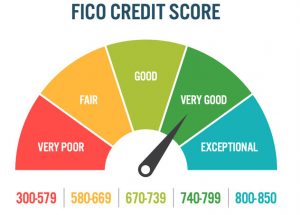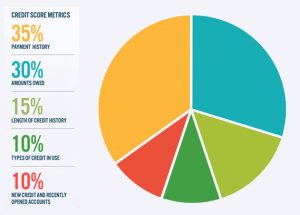Is Your Credit Score in Check?
Our credit score isn’t always top of mind, despite the fact that our everyday actions can greatly impact that crucial three-digit number. Reviving a credit score can seem like an impossible task, but there are steps you can take to get a low score back on track or maintain a high score.
How Your Score is Calculated
Five metrics determine your score. Each metric is a percentage of the total score. The larger the percentage, the more important the metric.
Circumstances That Affect Credit Score
When it comes to credit, you’re guilty until proven innocent. Any major financial shift may hurt your score initially, until you can prove that you’re consistent with payments in those areas. These life events may affect your finances, and then, as a result, your credit:
- Getting a mortgage
- Divorce
- Job Loss
- Bankruptcy
- Short sales/foreclosures
- Taking out loans
- Leasing or buying a car
Bouncing Back From A Low Credit Score
- Know Your Credit Score – Everybody gets one freebie report from the major agencies. Review it closely and report any errors to the agency to fix.
- Set Payment Reminders – Set alerts so you never forget to pay a bill. Use automatic bill pay where you can.
- Pay Bills Bi-Weekly – This lowers your use of credit.
- Address Late Payments Quickly – Contact creditors immediately after a missed payment to soften the impact.
- Limit the Amount of Credit Lines You Open – Opening several accounts in a short period of time negatively affects your score.
- Keep Old Credit Accounts Open – Closing old accounts reduces the age of your credit and your overall credit amount, lowering your score.
- Leave Old Debt On Your Report – If you paid it off, this will positively impact your credit score in most cases.
- Pay Off “Revolving Debt” – Get rid of credit card debt that stays with you month-to-month. Pay off cards closest to credit limit first.
- Manage Time Wisely When Shopping for A Loan – A 14 to 45-day search is optimal to protect your credit.
- Consider A Secured Credit Card – Requires cardholder to keep the balance of the credit limit in a bank account that is untouchable until the card is closed.
 Develop Good Habits
Develop Good Habits
- Utilize less than 30% credit per billing cycle.
- Start by using only one or two credit cards during the rebuilding process.
- It typically takes 3-6 months of good credit activity to see an improvement in your score.
Want more information on how to keep your credit in check? Give me a call!




